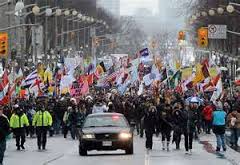You have to wonder if Stephen Harper isn’t actively trying to provoke serious conflict with First Nations.
There has been over 4 months of ongoing protest, hunger strikes, long distance marches by Indigenous youth, heated negotiations with First Nation leadership, vociferous opposition party criticism in Parliament, and widespread calls for action from non-Indigenous people across Canada.
During that time, his personally chosen First Nation representative in the Senate was suspended from his position and charged with a criminal offence, his Minister for Aboriginal Affairs had to resign in disgrace, the replacement Minister has stumbled out of the blocks, and there has been no progress on any of the issues behind it all.
He has stonily refused to address any of the concerns raised by the Idle No More movement over his unconstitutional legislative agenda.
The tables on treaties and comprehensive claims that were the sole product of the January 11th meeting between Harper and AFN National Chief Shawn Atleo have produced no results to date.
First Nations objections to resource development projects from the Enbridge and Keystone XL pipelines to the Ring of Fire continue undiminished and unaddressed.
New, unilaterally imposed conditions on funding have prompted several First Nations to refuse to agree to receive money for essential services and prompted Elder Raymond Robinson’s recent hunger strike, now in its third day.
A breakdown in federal-provincial funding arrangements for First Nations policing has brought about the cancellation of service in 26 communities across Quebec and threaten a similar crisis across northern Ontario where conditions have led to the suicide of 2 Nishnabe Aski Nation police officers.
And with the release of Aboriginal Affairs’ Report on Plans and Priorities (RPP), we see that departmental spending actually will go down by over $500 million next year and more than $1.5 billion before the next election in 2015.
In my last blog, I detailed $73 million in new spending identified in the recent budget. It turns out that this will not match the cuts coming over the next two years.
Planned spending of $8.4 billion in 2012-13 will fall to $6.9 billion in 2014-15, an 18% reduction.
Core services in the area of education, infrastructure and social development – the programmes that have created and maintained third world conditions on reserve – will fall by a total of $10.4 million. This includes small increases in education and infrastructure such as housing and water, doing little to address existing need, let alone growth due to inflation and population increases. The overall reduction is due to a cut in social assistance funding of $97.4 million which should tell us all what Harper expects to happen as a result of his new workfare program.
And First Nations governance, an area where the Harper government has focused its criticism and the subject of the recently passed First Nations Accountability Act, will be cut by 15%. No doubt Mr. Harper feels this is the best way to support the new reporting requirements.
Of particular note, the ministry’s RPP rates the “Aboriginal Relationship Risk as very high”, with “mitigation strategies” that amount to more funding cuts. Specifically, “co-operative relations” will see a reduction of $534.9 million and a 38% reduction in staff, a dubious way of managing the department’s highest risk.
Meanwhile, departmental staffing for internal services such as communications and legal counsel – where a whopping 31% of Aboriginal Affairs staff work – will be reduced by only 5%. Of course, none of those services go to First Nations.
Certainly, those employees will be needed to fight the numerous court cases Harper’s policies are engendering. Not that his Aboriginal Affairs department is expecting them. In fact, the RPP forecasts a reduction in current total liabilities (now over $14 billion) while admitting that “new claims and litigation and new environmental liabilities cannot be reasonably foreseen or quantified and have therefore been excluded from the forecast.”
Given these circumstances, what can be reasonably foreseen is mounting conflict, more litigation and protest certainly, but the increasingly real risk of outright confrontation. The only question is whether this isn’t in fact the Prime Minister’s intention.



